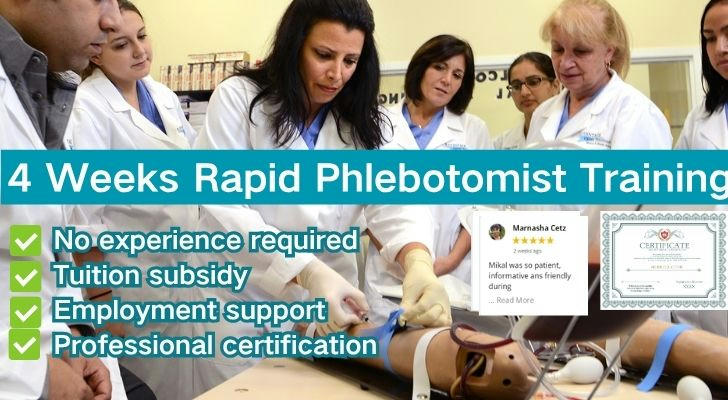4-Week Phlebotomist Training | Tuition Subsidy + Professional Certification
Starting a healthcare career isn’t easy. But phlebotomist training allows you to get certified quickly (in as little as 4 weeks), even for people with no healthcare experience. Many programs offer high-quality internships and job placement support. Tuition subsidies and employer-sponsored programs are available.
This article will provide a variety of training options to help you complete your phlebotomist training certification.

Why Choose Professional Certified Phlebotomist Training?
1. Quick Certification with High Employment Demand
The U.S. Bureau of Labor Statistics predicts that phlebotomy jobs will grow 22% from 2020 to 2030, far outpacing the average growth rate for other fields.Many programs offer students rapid certification as phlebotomists through training, such as Phlebotomy Career Training, which aims to enable students to complete training and acquire skills in as little as 4 weeks.
2. Job Placement Support& Internship Resources
Your advisor can provide you with a letter to help you get an internship. Most accredited programs include direct placement assistance, partnering with hospitals and laboratories to ensure students find stable employment quickly.
3. Tuition Subsidy Programs Available
Financial support options help reduce tuition costs significantly, allowing trainees to focus on their education and career without the burden of excessive debt.
4. No Prior Experience Required
Whether you're switching careers, returning to work, or entering the workforce for the first time, phlebotomy training welcomes individuals with zero healthcare background. Typically only a high school diploma or GED is required
5. Certification Recognized Nationwide
Graduates receive certifications such as the Certified Phlebotomy Technician (CPT), accredited by organizations like the National Healthcareer Association (NHA), National Center for Competency Testing (NCCT), and American Society for Clinical Pathology (ASCP), increasing their employment competitiveness across the U.S.
How to Apply for Phlebotomist Training with Tuition Subsidy?
1️⃣ 1. Check Eligibility Requirements
Applicants typically need a high school diploma or GED and must pass a basic background check.
2️⃣ 2. Research Accredited Programs
Look for programs certified by NHA, NCCT, or ASCP, which include both classroom and clinical components.
3️⃣ 3. Apply for Financial Assistance
Many state workforce development boards offer tuition support options that can significantly reduce training costs.
4️⃣ 4. Enroll and Begin Training
Upon acceptance, students attend both theoretical and hands-on clinical classes, usually completing the program in 4-6 months.
5️⃣ 5. Complete Certification Exam
After training, graduates take a national certification exam to become credentialed phlebotomists recognized across the country.
What Paid Phlebotomist Training Options Exist?
🔹 MedCerts — Phlebotomy Technician Program
12-week online course, including virtual simulation and certification exam preparation
WIOA funded partner institutions to provide career guidance services
🔹 Penn Foster
Online Learning. The External Internship Coordinator will help you find an internship location to complete your internship
🔹 Northwest Phlebotomy School
Group lessons and one-on-one instruction from teachers
Who Is Suitable for a Phlebotomist Job?
Phlebotomy training is ideal for people at any stage of life — from recent graduates to mid-career professionals.
18-24 years old: Recent graduates looking to enter healthcare quickly with certification.
25-34 years old: Career changers seeking stable jobs after short-term training.
35-44 years old: Returning to the workforce, seeking flexible hours and job security.
45-55 years old: Mid-career professionals looking for stable, long-term income.
Real Success Story: A trainee with zero experience completed training in 4 weeks and successfully joined a medical institution
Jessica, 32, from Dallas, TX, worked as a retail cashier for nearly a decade before deciding to pursue phlebotomy. With no healthcare experience, she enrolled in a 4-week intensive training program that included high-quality internships and paid clinical rotations. After completing her certification, Jessica secured full-time employment at a local hospital laboratory, earning steady income and enjoying a stable work schedule that allows her to balance family life and career growth.

Pursuing professional phlebotomy training opens the door to a stable and rewarding healthcare career, even for those with no prior experience. With flexible programs, financial support options, and growing demand in the field, many individuals are finding success and long-term security through certified phlebotomy careers.
Take the first step today and explore accredited phlebotomy training programs that fit your goals and schedule.
